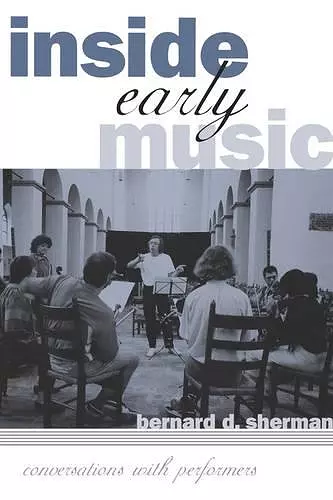Inside Early Music
Conversations with Performers
Format:Paperback
Publisher:Oxford University Press Inc
Published:30th Oct '03
Currently unavailable, currently targeted to be due back around 25th January 2025, but could change

The attempt to play music with the styles and instruments of its era--commonly referred to as the early music movement--has become immensely popular in recent years. For instance, Billboard's "Top Classical Albums" of 1993 and 1994 featured Anonymous 4, who sing medieval music, and the best-selling Beethoven recording of 1995 was a period-instruments symphony cycle led by John Eliot Gardiner, who is Deutsche Grammophon's top-selling living conductor. But the movement has generated as much controversy as it has best-selling records, not only about the merits of its results, but also about the validity of its approach. To what degree can we recreate long-lost performing styles? How important are historical period instruments for the performance of a piece? Why should musicians bother with historical information? Are they sacrificing art to scholarship? Now, in Inside Early Music, Bernard D. Sherman has invited many of the leading practitioners to speak out about their passion for early music--why they are attracted to this movement and how it shapes their work. Readers listen in on conversations with conductors Gardiner, William Christie, and Roger Norrington, Peter Phillips of the Tallis Scholars, vocalists Susan Hellauer of Anonymous 4, forte pianist Robert Levin, cellist Anner Bylsma, and many other leading artists. The book is divided into musical eras--Medieval, Renaissance, Baroque, and Classic and Romantic--with each interview focusing on particular composers or styles, touching on heated topics such as the debate over what is "authentic," the value of playing on period instruments, and how to interpret the composer's intentions. Whether debating how to perform Monteverdi's madrigals or comparing Andrew Lawrence-King's Renaissance harp playing to jazz, the performers convey not only a devotion to the spirit of period performance, but the joy of discovery as they struggle to bring the music most truthfully to life. Spurred on by Sherman's probing questions and immense knowledge of the subject, these conversations movingly document the aspirations, growing pains, and emerging maturity of the most exciting movement in contemporary classical performance, allowing each artist's personality and love for his or her craft to shine through. From medieval plainchant to Brahms' orchestral works, Inside Early Music takes readers-whether enthusiasts or detractors-behind the scenes to provide a masterful portrait of early music's controversies, challenges, and rewards.
"Excellent . . . . The teeming practical detail of this book is a great achievement in itself, but equally significant is its documentation of the major conceptual issues behind the historical-performance movement" --Anthony Pryer, The Times Literary Supplement, Jan. 16, 1998
"Inside Early Music is an outstanding achievement. Bernard Sherman has managed to give a broad overview of current trends in historical performance while at the same time focusing on enough of the interesting details and current hot topics to give the book an unexpected depth. He achieves this through his thoughtful selection of interviewees, each discussing his or her own area of specialization, and also through his probing questions."--Continuo
"...a book of unparalleled interest. It bristles with sharply defined positions and passionate arguments, all of them expressed with clarity and augmented by the author's insightful and well-informed reflections." --Timothy J. McGee, Library Journal, May 1997
"I can't imagine a better book of its kind."--Richard Taruskin, author of Text and Act and Stravinsky and the Russian Traditions
"Inside Early Music is a fascinating book, and not just for readers with an interest in early music. Sherman's pointed interviews with opinionated people, and his lucid introduction and postscripts, offer considerable insight into questions about the nature of art, the nature of human nature, and some of the great intellectual controversies of our time."--Steven Pinker, author The Language Instinct and How the Mind Works
"Bernard Sherman is one of the shrewdest, best informed, and most sensible commentators on the 'early music' scene. This book should be required reading for anyone concerned with issues of so called authentic performance."- Walter Frisch, Columbia University, author ofBrahms and the Principle of Developing Variation and Brahms: The Four Symphonies
"An important contribution to our understanding of the early music phenomenon. On topics ranging from Hildegard to Brahms, Sherman knows whom to ask and what to ask them."- Stewart Carter, Wake Forest University, editor ofA Performer's Guide to Seventeenth Century Music and the Historic Brass Society Journal, former editor of Historical Performance
"Sherman is no 'invisible' interviewer -he's actively concerned with the historical record, with traditions, and with distinguishing between matters of personal taste and objective judgment. He invites these artists to speak of their deepest musical convictions even as he challenges them with competing points of view (and not only those they are accustomed to hearing). As a result, many arguments that seemed merely polemical in the popular press are shown to be subtle, urgent and deep. The associated discographies highlight some of the most exciting and moving performances now available, and there's a storehouse of wisdom in Sherman's discussions of 'further reading.' This is a superb achievement--years in the making--and brilliantly done."--George Barth, Stanford University, author of The Pianist as Orator
"These are eloquent artists with a lot to say about converting dusty manuscripts to living music, and Sherman guides the conversations with a sure hand... Inside Early Music provides that which is all too rare: serious entertainment."--Billboard
"Thought-provoking and immensely stimulating, this collection of twenty interviews with some of the leading practicioners of the early-music world appears at a timely moment."--Brian Robbins, Fanfare
ISBN: 9780195169454
Dimensions: 151mm x 239mm x 29mm
Weight: 653g
432 pages